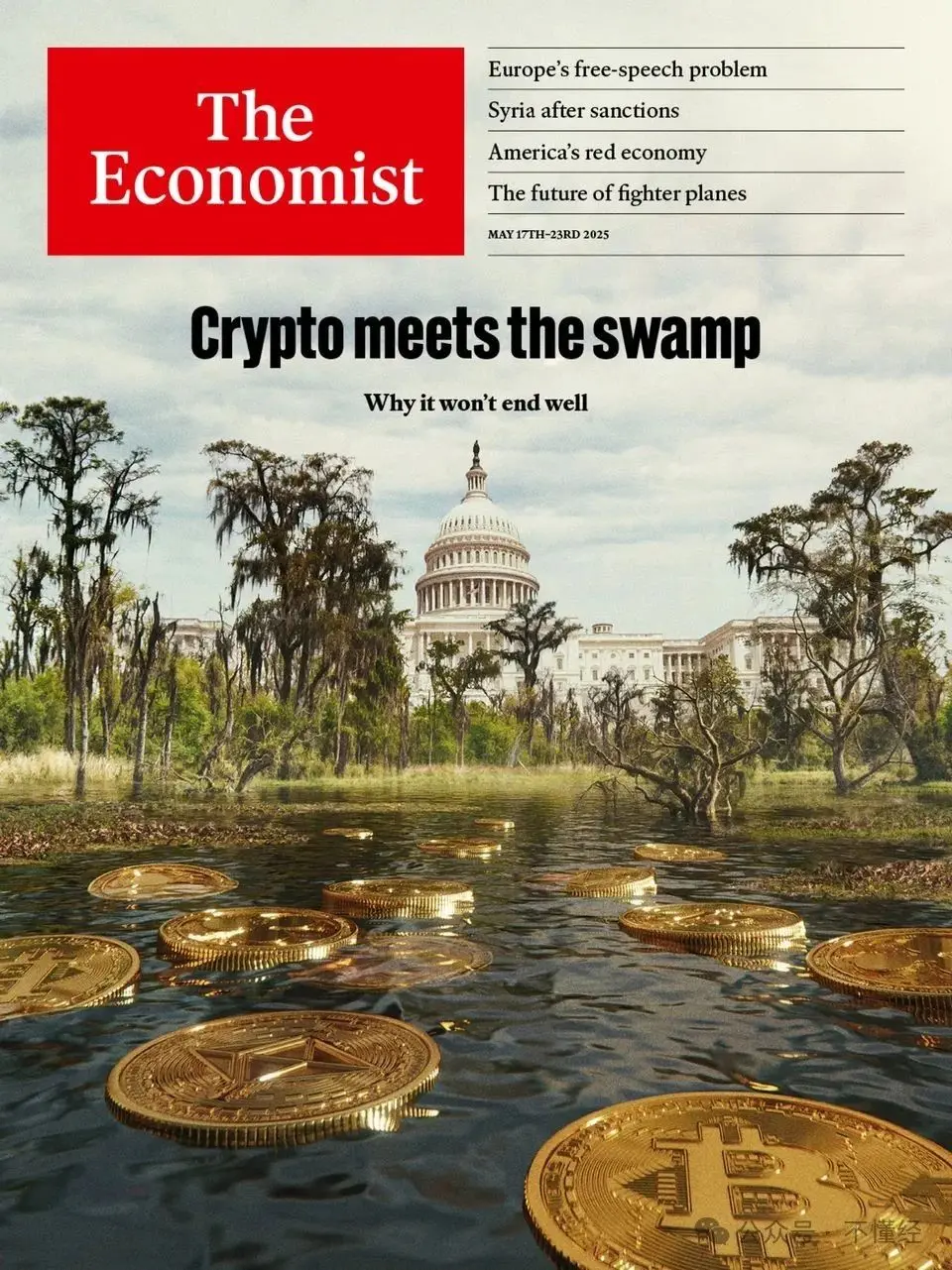作者:不懂经也叔的 Rust ,不懂经
“抽干沼泽”( Drain the Swamp ),是特朗普的核心竞选承诺,意思是要清除华盛顿的政治腐败和特殊利益集团。然而,在加密货币问题上,他似乎正在亲手挖掘一个新的、更隐蔽、也可能更危险的“数字沼泽”。
曾经,加密世界的主角是中本聪,如今,主角则是”没有人比我更懂“的美国总统。特朗普曾断言,加密货币“极度波动,毫无支撑”;如今却摇身一变,称加密社区“充满了建国时代的精神,令人兴奋” 。
这种戏剧性的转折背后,不仅仅是个人态度的变化,更折射出加密货币——这个曾经承载着颠覆与理想的“屠龙少年”,已经一步步“沼泽化”,甚至异化为某些权力玩家手中点石成金的“炼金石”。
我们正处在一个吊诡的时代节点:一项宣称要“去中心化”、摆脱权力控制的技术,如今却与最顶层的政治权力眉来眼去,甚至深度捆绑。这不仅是对其初衷的背叛,更可能导致超出金融层面的存在主义危机。
经济学人杂志最新一期的封面文章,加密货币已成为终极的“沼泽资产”。在某种意义上,这是革命的胜利吗?
今天结合文章内容,来聊聊霸道总统为什么爱上了加密,这背后的反转、金权游戏与危机。

一、特朗普的“加密盛宴”:一场精心编排的“镀金游戏”
故事的高潮,莫过于 202 5 年 5 月 22 日那场计划中的晚宴。几周前,特朗普亲自发布的 Meme 梗币——$ TRUMP ,一度濒临归零,几乎要成为币圈笑话 。
然而,总统的亲自“加持”如同一剂强心针,让它瞬间获得了某种“真实价值”。$ TRUMP 币的创始团队发起了“朝圣”邀请:币值排名前 220 的持币人,可获得与特朗普共进晚餐的“殊荣”,其中排名前 25 位的大户,更能参与 VIP 招待会,与总统“亲密接触” 。
消息一出,币圈为之疯狂,抢购潮汹涌而至。最终的“幸运儿”名单,构成了一幅光怪陆离的众生相:既有腰缠万贯的加密大咖,也有狂热的 MAGA (让美国再次伟大)拥趸,更有纯粹的投机客 。
一位计划从亚洲专程飞赴美国,希望能为他那“推动下一代 Meme 文化”的区块链项目拉到投资;另一位来自纽约的特朗普支持者,曾豪掷加密货币购买特朗普品牌手表;甚至还有一位戴着面罩,以“网络侦探”身份示人,专门追踪被盗数字资产的神秘人物 。区块链数据无情地揭示, VIP 席位中,外国人的身影并不鲜见 。
这场看似名流云集的盛宴,无疑充满了争议。美国政府监督组织纷纷谴责,直指其可能违反联邦禁止官员接受馈赠的相关法规。更有甚者,若席间出现与外国政府有牵连的人物,晚宴甚至可能触犯《美国宪法》中庄严的薪酬条款( Emoluments Clause ),该条款严禁联邦官员接受外国政府的任何财物馈赠 。前奥巴马政府白宫道德与政府改革特别顾问更一针见血地评价:“这是一场道德噩梦。”
特朗普连任仅四个月,他的家族便以前所未有的速度和广度,推动着私人商业利益的扩张。 Meme 币晚宴只是冰山一角。他们在加密领域的布局远不止于此:一家比特币挖矿公司,以及由他儿子高调推出的名为“世界自由金融”( World Liberty Financial )的项目,都清晰地刻上了特朗普家族的印记 。
有批评者尖锐地指出,在特朗普大幅放松对加密货币监管的大背景下,这些行为构成了严重的利益冲突。白宫发言人则轻描淡写地回应,称懂王始终以美国民众利益为重, Meme 币晚宴属于“私人商业活动”,与白宫官方无关 。这都能信的话,只能说美国人天真。
这不仅仅是一场晚宴,更像是一场精心编排的“镀金游戏”。$ TRUMP 币的交易手续费,以及亲信手中据称仍持有的价值约 100 亿美元的代币 ,都说明了这场游戏的真正赢家。
链上分析公司 Chainalysis 的数据显示,虽然有 58 位投资者靠此币获利超过 1000 万美元,但约有76.4万个钱包因此亏损,其中绝大多数,恐怕正是那些被“一夜暴富”神话吸引而来的散户 。当权贵们在觥筹交错间瓜分利益,无数普通投资者的梦想却可能化为泡影。
二、加密货币的“沼泽化”:从“屠龙少年”到“恶龙本身”
(一)破碎的乌托邦:理想的褪色与初衷的背离
回望加密货币的缘起,我们曾听到过多少激动人心的宣言。2009年比特币横空出世,一个充满乌托邦色彩、闪耀着反威权主义光芒的运动随之兴起 。早期的加密货币信徒们怀揣着崇高甚至伟大的目标:他们渴望彻底颠覆既有的金融体系,保护个人财产免受通货膨胀的侵蚀和不公正的征用 。他们梦想将权力从大型金融机构手中夺回,交到每一个普通投资者手中。
在他们眼中,加密货币不仅仅是一种资产,更是一项解放的技术,一种能够带来更公平、更透明世界的工具 。加密布道者安德烈亚斯·安东诺普洛斯( Andreas Antonopoulos )曾激情澎湃地宣称:“比特币就是颠覆。它带来的冲击之大,是绝大多数人至今都难以想象的……彻底的颠覆。完全去中心化的货币,没有国界……比特币是为全球六十亿无银行账户人口而生的。”
那时的加密世界,洋溢着一种“技术宅”式的理想主义。它试图同时扮演多种角色:一种价值存储工具,一种高回报的投资品,一种能让人们点对点转账而无需经过政府和银行控制渠道的金融技术 。它承诺提供某种程度的匿名性和隐私保护,让人们不必时刻感觉“山姆大叔”在背后盯着。它从根本上提供了一个跳出传统体系的选择,因为早期的支持者对现有金融系统充满了极度的不信任 。
然而,十几年白驹过隙,现实却与最初的理想渐行渐远。显而易见,加密货币的理想在不断“缩水” 。除非你是那种死忠的加密信仰者,否则你大概已经不再认为加密货币能取代全球金融体系,终结美元、欧元、日元的统治,或者让银行体系彻底消失 。
(二)泥沙俱下的现实:“沼泽资产”的诞生
如今的加密货币,更多时候呈现出的是另一番景象。它变成了一种高度投机的工具,人们买入、持有,期待它涨价;或者做空,期待它跌价;又或者投资某些加密公司,希望它能跑赢大盘。
还有饱受诟病的,它在黑市交易中扮演了基础性的角色,广泛用于人口贩运、毒品交易、恐怖主义融资等非法活动。许多加密活动之所以选择在美国以外的司法管辖区进行,正是因为相关企业不愿或无法遵守美国的证券和银行法规。
“沼泽资产”——这个由《经济学人》提出的概念,精准地概括了加密货币当前的尴尬处境 。一个曾梦想“远离政治”的行业,如今却成了“以权谋私”的代名词,与美国政府行政部门发展出一种远超华尔街或其他任何行业的“肮脏关系” 。这无疑是巨大的讽刺。
加密货币行业巨头们,正将数以亿计的美元投入政治游说,用于维护那些对他们友好的立法者,并无情打击那些试图对其进行监管的反对者。总统的儿子们在世界各地兜售着他们的加密项目,而总统本人则用加密晚宴这样的形式,与最大的投资者们进行利益交换。
美国第一家庭持有的加密货币如今价值数十亿美元,这甚至可能成为该家族最大的单一财富来源。
这种“沼泽化”的趋势,与世界其他主要经济体形成了鲜明对比。
近年来,欧盟、日本、新加坡、瑞士和阿联酋等国家和地区,都在没有出现类似猖獗利益冲突的情况下,成功地为数字资产提供了新的监管清晰度。在那些政府征用行为普遍、通货膨胀高企、货币贬值风险真实存在的发展中国家,加密货币在某种程度上,依然扮演着早期理想主义者所期望的角色 。
具有讽刺意味的是,这一切都发生在数字资产底层技术日渐成熟的背景下。投机行为依然盛行,但主流金融公司和科技巨头也开始更严肃地对待加密货币。现实世界资产的“代币化”进程正在加速,贝莱德( BlackRock )和富兰克林邓普顿( Franklin Templeton )这样的传统金融机构,也已成为代币化货币市场基金的大型发行商 。支付领域的应用也展现出巨大潜力,万事达卡( Mastercard )和 Stripe 等公司纷纷拥抱稳定币 。
然而,在美国,这个本应引领创新的国度,加密货币行业却似乎选择了一条与权力共舞的捷径。他们辩称,在拜登政府时期,由于 SEC 主席加里·根斯勒( Gary Gensler )的强硬立场和频繁的执法行动,他们除了“不择手段地斗争”之外别无选择 。银行因害怕监管压力而不敢向加密货币公司提供服务,也不敢轻易涉足该领域 。
这种说法有其一定的道理,通过法院而非国会来明确加密货币的法律地位,确实效率低下且不尽公平 。但如今,随着特朗普的上台,监管的钟摆似乎正猛烈地摆向另一个极端,大多数针对加密货币公司的案件已被撤销 。这究竟是行业的胜利,还是为更大的危机埋下了伏笔?
三、特朗普为何爱上加密:糖衣炮弹还是潘多拉魔盒?
特朗普对加密货币态度的 180 度大转弯,是近年来美国政坛最引人注目的现象之一。从曾经的“我不喜欢比特币和其他加密货币,它们不是货币,价值极度波动,毫无实质基础” ,到如今宣称要让美国成为“全球加密之都”和“无可争议的比特币超级强国” ,这背后究竟是深思熟虑的政策转向,还是一场精心计算的政治与商业联姻?
(一)“糖衣”之下:特朗普为何拥抱加密?
特朗普的“加密偏爱”,绝非空穴来风,其背后驱动力复杂又直接:
1.赤裸裸的经济利益:这是最直接也最不加掩饰的动机。特朗普及其家族成员已经深度介入加密货币的投资与运营。无论是让他和合作伙伴赚得盆满钵满的$ TRUMP 模因币 ,还是他两个儿子投资的比特币矿业公司,以及他们持有多数股权的 World Liberty Financial ,都清晰地指向了个人财富的增长。总统及其家族,正在从这个新兴产业中直接获利。
2.现实的政治考量:加密社区被特朗普形容为“充满了建国时的精神,令人兴奋” 。这背后,是对这个群体政治能量的觊觎。加密货币的拥护者通常年轻、富有激情,并且在经济上具有一定实力。争取他们的选票和竞选捐款,对于任何政治人物而言都极具诱惑力。特朗普承诺出台有利加密的立法,并将拜登政府描绘成扼杀新兴产业的“刽子手” ,正是为了迎合这一群体的诉求。
3.一以贯之的反监管立场:特朗普政府的核心政策之一便是放松管制。加密货币行业对现有金融监管体系的挑战,以及其对更宽松环境的渴望,与特朗普的施政理念不谋而合。将加密货币从 SEC 等机构的“束缚”中解放出来,符合他削弱监管机构权力的整体战略 。
4.“颠覆者”形象的自我强化:加密货币本身带有的反建制、挑战传统的色彩,在某种程度上也契合了特朗普一直试图塑造的“局外人”和“颠覆者”形象。拥抱这个被主流金融界视为“异类”的领域,或许能进一步巩固其在特定选民群体中的号召力。
(二)“炮弹”与“魔盒”:潜在的巨大风险
然而,特朗普的“加密偏爱”所包裹的糖衣之下,却可能隐藏着足以炸毁整个金融体系的“炮弹”,或是释放出无数灾难的“潘多拉魔盒”。其风险是多维度、深层次的:
1. 金融体系的系统性风险:
波动性传染:加密货币的“极度波动,叙事支撑” 的本质并未改变。在监管缺失的情况下,如果任由深度融入主流金融体系,其固有的不稳定性可能会通过各种渠道传染给传统金融市场,引发系统性危机。有内业人士警告,比特币可能会成为今天的信用违约掉期( CDS )或次级按揭证券( MBS )——那些引爆 2008 年金融危机的复杂且监管不足的金融工具 。
监管套利泛滥:金融机构天生具有规避监管的冲动。如果加密领域成为新的“法外之地”,华尔街公司很可能会利用这波“加密友好政策”,将自家业务“重塑”为加密业务,从而绕过现有的、旨在保护金融稳定的监管框架 。
“战略比特币储备”的荒谬与危险:特朗普政府提出的建立所谓“战略比特币储备”,计划动用高达 1000 亿美元的公共资金购买比特币、以太坊等加密货币 ,更是被专家斥为“毫无意义,甚至愚蠢透顶的主意” 。
与具有实际战略价值的石油或药品储备不同,比特币储备除了给加密行业输送巨额利益外,几乎没有任何战略意义可言。这实际上是将纳税人的钱投入到高度投机的资产中,风险完全社会化。
2008 年危机的重演:一旦这些风险爆发,其影响将远超“炒币的人”,而是会波及所有拥有房贷、退休账户,或希望通过贷款创业的普通美国人 。因为整个金融系统建立在“信任”基础上,当不透明的风险被悄然植入,监管被刻意削弱,信任的崩塌只是时间问题 。更可怕的是,当年为应对危机而出台的《多德-弗兰克法案》等“防火墙”,如今正在被特朗普政府逐步拆除 。
2、普通投资者风险:刚出火坑,又进沼泽
诈骗横行,血本无归:加密货币领域充斥着各种诈骗和庞氏骗局。许多公司一夜之间冒出,用天花乱坠的承诺专门针对那些不太懂金融和技术的人下手。一旦被骗,由于加密货币的匿名性和难以追踪性,损失几乎无法挽回。
与传统银行体系中层层设防的风险提示和反诈骗机制相比,加密货币世界如同一个“黑暗丛林” 。老年人、退伍军人、初创企业主,甚至只是在交友软件上寻找伴侣的人,都可能成为诈骗的受害者,损失金额高达数百亿美元 。
“民主化”的假象与散户的悲歌:类似$ TRUMP 晚宴这样的活动,虽然表面上看似为普通人提供了接触顶层权力的机会 ,但其背后往往是少数内部人士的暴富和大量散户的亏损。 Meme 币的狂热尤其如此,其暴涨暴跌的特性使得大多数后来者都沦为“接盘侠” 。
3、国家级腐败与危机:
特朗普曾以“排干沼泽”( Drain the Swamp )作为其核心竞选承诺之一,意指清除华盛顿的政治腐败和特殊利益集团。然而,在加密货币问题上,他似乎正在亲手挖掘一个新的、更隐蔽、也可能更危险的“数字沼泽”。
这只曾经承载着自由主义理想的“独角兽”,正在异化为一只盘踞在权力中心的“沼泽神兽”。
史无前例的利益冲突:总统及其家族直接从一个他们正在积极推动放松监管的行业中获取巨额经济利益,这种赤裸裸的利益冲突,其程度和范围在美国现代政治史上都极为罕见。这已经不仅仅是“白宫旁边开个特朗普酒店”的问题,而是将国家公器私有化的“加大号腐败版本”,甚至让人联想到“香蕉共和国”式的治理失能 。
“贿赂通道”的制度化:$ TRUMP 晚宴和与某些有案底的加密巨头进行股权谈判等行为 ,实质上是将政治影响力明码标价,为利益集团提供了“买通”权力核心的通道。这严重侵蚀了政治的廉洁性和决策的公正性。
恐怖融资与网络盗窃的温床:加密系统因其匿名性和跨境流动的便利性,已成为国家级黑客组织(如朝鲜的“拉撒路小组” )和恐怖组织进行资金盗窃和恐怖融资的理想工具。
结语:“我,我, Meme ”时代的反思
“我,我, Me me ( Me , me , me me )” ——这个模仿“ Me , me , me ”的双关语,精准地捕捉了当前加密货币与政治权力结合的自私本质。
一个曾宣称要为大众赋能的技术,如今却似乎更热衷于为少数权贵服务。加密货币在政策制定桌上获得了前所未有的角色,但其声誉和命运,也已与其政治恩主的沉浮紧密相连 。
特朗普对加密货币的“偏爱”,短期内或许能为他和他的家族带来巨大的经济利益,也能为加密行业争取到宽松的监管环境。但正如《经济学人》所警示的那样,这笔交易的好处,最终可能只会单向流动 。当政治风向转变,或者当风险积累到临界点并最终爆发时,曾经的“蜜月”可能会瞬间变为“梦魇”。
加密货币的技术本身并非原罪,其在支付、资产代币化等领域依然展现出积极的创新潜力。但当这种潜力被政治投机和无底线的利益追逐所绑架,当“创新”沦为“寻租”的幌子,其带来的就可能是灾难性的后果。
人们需要的,是真正能够惠及大众、推动社会进步的金融创新,而不是一场最终由普通人买单的“沼泽狂欢”。
免责声明:本文章仅代表作者个人观点,不代表本平台的立场和观点。本文章仅供信息分享,不构成对任何人的任何投资建议。用户与作者之间的任何争议,与本平台无关。如网页中刊载的文章或图片涉及侵权,请提供相关的权利证明和身份证明发送邮件到support@aicoin.com,本平台相关工作人员将会进行核查。




